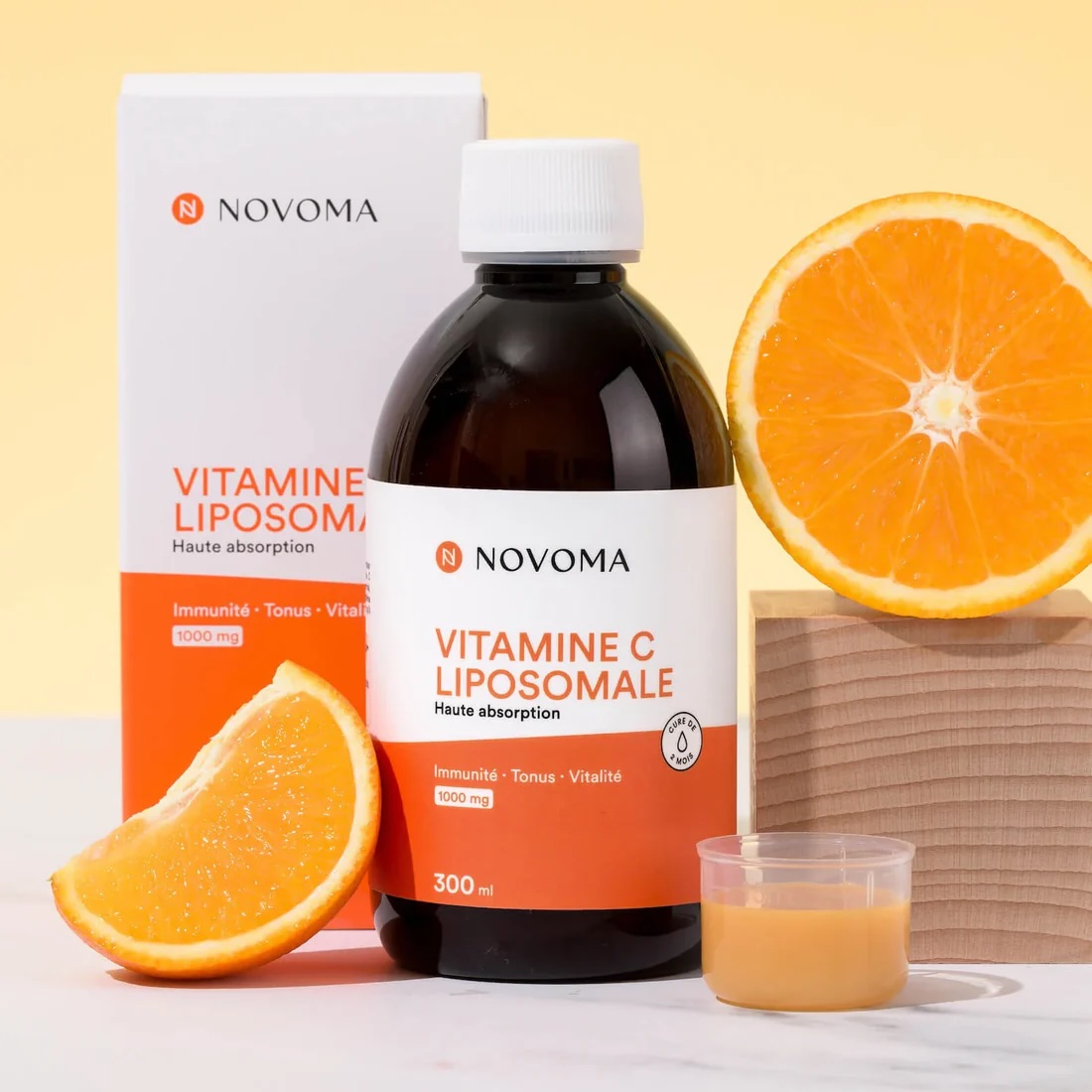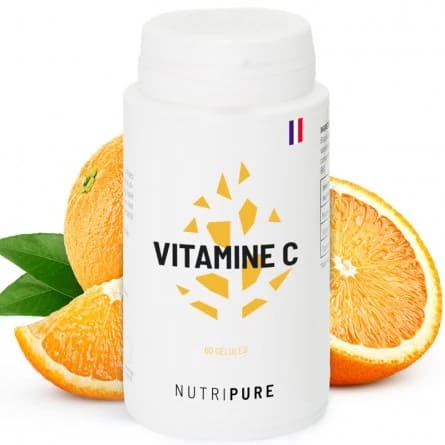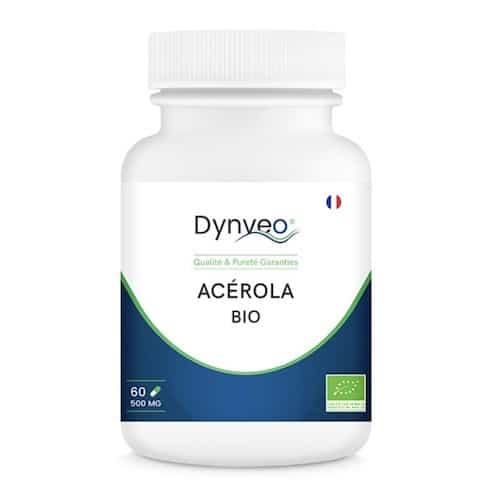We analyzed 12 products sold online and selected these three supplements:
Meilleure Vitamine C 2026 🥇
> Vitamine C Liposomale Quali-C – Novoma
Meilleure rapport qualité / prix
> Vitamine C Pure Quali-C – Nutripure
Meilleure vitamine C naturelle
> Acerola Bio Pure 34% de Vitamine C Naturelle – Dynveo
Best vitamin C
Our selection criteria
- Form : the form in which vitamin C is presented.
- Dosage : amount of vitamin C contained in a recommended daily dose.
- Usage : instructions for use.
- Price / day : the price for 1 day of supplementation, with the daily dose recommended by the manufacturer.
- Customer reviews : this average of customer reviews comes from the manufacturer’s website, review platforms or marketplaces like Amazon.
- Our opinion on the brand : based on tests of supplement brands that we carry out every month and the analysis of 6 quality criteria.
All supplements listed below are made in France, are vegan, and contain no additives or excipients.
BEST VITAMIN C 🥇
Brand : Novoma
Form : liposomal
Dosage : 1000 mg
Use : 5 mL per day
Price / day : 0,67 €
Customer reviews : 4.5/5 (truspilot.com)
Novoma’s liquid liposomal vitamin C is, in our opinion, the best option.
The liposomal process consists of encapsulating vitamin C in liposomes (fatty bodies) that protect it and make it fat-soluble. This innovative form of vitamin C has three advantages: improved absorption, excellent intestinal tolerance, and gradual release into the body.
The daily dose of 1000 mg of vitamin C is optimal and higher than that of many other similar supplements.
This supplement contains Quali-C vitamin C, which is the highest pharmaceutical-grade purity to date and is certified in Europe. The supplement itself is made in Brittany.
Each 300 mL bottle provides a 2-month supply and is made from 100% recycled, recyclable R-PET.
Novoma is a French brand founded in 2012 that offers supplements focused on active ingredients at controlled prices (read our full review here).
BEST VALUE FOR MONEY
Brand : Nutripure
Form : L-ascorbic acid
Dosage : 750 mg
Usage : 1 capsule per day
Price / day : 0.23 €
Customer reviews : 4.3/5 (amazon.fr)
We chose Nutripure’s vitamin C for its unbeatable value for money.
This form of vitamin C has fewer benefits than liposomal vitamin C but has the advantage of being much more affordable. The active ingredient used is Quali-C certified (purity, European origin).
The form of vitamin C used is L-ascorbic acid, the form naturally present in foods. Manufacturing is carried out in Scotland, unlike most vitamin C on the market, which are manufactured in China.
1 capsule contains 750 mg of vitamin C, a satisfactory amount for the body.
Nutripure was co-founded by a top-level athlete, a five-time world karate champion. The ingredients offered by the laboratory are of high quality and minimize food additives as much as possible.
Manufacturing is French and prices are fair (see our full review of the brand).
BEST NATURAL VITAMIN C
Brand : Dynveo
Form : natural (organic acerola)
Dosage : 340 mg
Usage : 2 capsules per day
Price / day : €0.70
Customer reviews : 4.8/5 (avis-verifies.com)
We selected Dynveo’s natural vitamin C.
It is an acerola extract standardized to 34% vitamin C – an exceptional concentration compared with other small fruits sold in pharmacies or online. The acerola used comes from the Amazon, its native region, and is harvested when its vitamin C content is at its maximum.
The extraction is organic and eco-friendly, using water and no solvents, from fruits sourced through a very strict program that ensures ethical and sustainable resource management.
Dynveo is a dietary supplement laboratory known for its expertise and product dosages. We tested and approved their customer service, which is responsive and knowledgeable (read our full review here to learn more).
What is vitamin C?
Vitamin C is also known as ascorbic acid. It takes its name from the disease it prevents, scurvy, caused by a deficiency in vitamin C. It plays a major role in the body and participates in many biological functions.
It strengthens and invigorates the immune system. That’s why it is considered the vitamin of energy and vitality.
It also protects against free radicals thanks to its antioxidant action. It contributes to the synthesis of collagen, improves iron absorption and helps prevent high blood pressure and cardiovascular disease.
What are the dietary sources of vitamin C?
Our bodies do not synthesize this water-soluble vitamin. It must therefore be obtained through the diet, focusing on foods rich in vitamin C.
Certain fruits, such as camu camu and rosehip, for example, contain exceptionally high amounts of it. It is also found in blackcurrant, kiwi, guava, goji berries and red berries in general.
Vegetables are also important sources of vitamin C, notably bell peppers, broccoli, Brussels sprouts, spinach and cherry tomatoes.
Finally, herbs such as fresh parsley also contain it.
Taking dietary supplements can also meet the necessary daily intake or address a deficiency. This is common among immunocompromised individuals, pregnant women, smokers and athletes.

What are its benefits?
It strengthens the immune system
This vitamin contributes to the normal functioning of the immune system. It strengthens natural defenses and promotes the production of white blood cells.
As shown by this study, it notably increases the number of lymphocytes and neutrophils.
It accumulates in white blood cells to enhance their effectiveness against microbes. Thus, it helps the body to fight off colds, infections, and other winter ailments.
Regular administration of vitamin C reduces the duration of colds, at sufficiently high doses, as indicated in this review.
That’s why it is often recommended to increase vitamin C intake during the winter months.
Protects against free radicals
Thanks to its antioxidant effects, it can combat free radicals. These accelerate cellular aging and increase the risk of disease.
On one hand, it prevents them from becoming established in the body, thereby preventing the damage they cause.
On the other hand, it traps excess free radicals and promotes their elimination. To do this, it works in synergy with vitamin E and provitamin A, which are also antioxidants.
This study shows the effectiveness of vitamin C in neutralizing free radicals.
Supports the cardiovascular system
Vitamin C plays a central role in the onset of cardiovascular diseases.
A review of trials concludes that supplementation with 500 mg of vitamin C for 6 weeks helps reduce overall blood pressure in hypertensive patients.
Additionally, the risk of heart disease would be reduced with sufficient vitamin C intake. Thus, a study of a population aged 39 to 79 shows that a high level of vitamin C (from dietary sources) in the body could reduce the risk of heart failure.
Promotes collagen production
It also plays a role in the biosynthesis of collagen. This structural protein is found especially in the skin, bones, and muscles. It ensures the maintenance and cohesion of tissues.
To produce collagen fibers, the body must modify certain amino acids, such as proline and lysine, through a hydroxylation reaction. This process is only possible in the presence of vitamin C.
It indirectly contributes to tissue production, to skin beauty, and even to wound healing.
This study shows the effect of vitamin C on collagen production.
Prevents skin aging
Vitamin C stimulates collagen synthesis and fights oxidants that promote the premature aging of skin tissues.
Additionally, vitamin C also helps to reduce melanin synthesis, the “pigment” of our skin, which leads to the appearance of unsightly brown spots, called “age spots” or “liver spots”.
Improves mood
Vitamin C, or ascorbic acid, influences the effect of certain catecholamines, neurotransmitters particularly linked to mood.
A daily intake of 3 grams of vitamin C (a dose exceeding the maximum recommended levels) for 14 days in 42 adults was associated with a reduction in depressive symptoms, as well as an increase in sexual activity, according to this clinical trial.
Reduces fatigue
Vitamin C is essential for the production of hormones and neurotransmitters, thereby influencing overall vitality and alertness.
Vitamin C deficiency has been demonstrated in various acute infections, notably in cases of long COVID.
In a scientific study, administration of high-dose vitamin C to patients with cancer or infections showed a reduction in fatigue and related symptoms (sleep disturbances, cognitive impairments, depressive symptoms).
Where to buy vitamin C?
- Pharmacies and drugstores
- Health food stores
- Specialty stores (sports nutrition, dietary supplements…)
- Specialized e-commerce
In what form?
In capsules and tablets
Capsules and tablets have the advantage of being convenient and easy to find. However, this format generally has a limited bioavailability.
Furthermore, they are often either underdosed or overdosed in vitamin C. Overdoses are common.
Finally, they may contain synthetic additives. Effervescent tablets, for example, can contain sweeteners, flavors, and artificial colorings.

In drops
The liquid form generally offers a higher concentration of vitamin C. In addition, it is rapidly absorbed by the body. This format is useful for those who have difficulty swallowing tablets or capsules.
In powder
The powder format allows for a more balanced and precise dosage than capsules or tablets. It thus reduces the risk of excessive consumption.
The powder is also less processed, purer and more natural. Its price is often more affordable.
In gummies
Gummies are chewable candies. They contain vitamin C combined with other vitamins, minerals and/or plant extracts.
It’s a convenient format, easy to take and fun. However, the risk of overdose remains significant if they are snacked on throughout the day.
They are generally low in active ingredients and contain sugar.
What is liposomal vitamin C?
Vitamin C is water-soluble, meaning it is only soluble in water. The liposomal process involves encapsulating it in tiny fat spheres called “liposomes”.
Thus, it is protected and becomes fat-soluble.
Liposomal vitamin C offers better absorption through the intestinal mucosa and cell membranes. It also has excellent stability: it does not degrade once in the body.
Finally, it is distributed in a more gradual way throughout the body.
Note that the effectiveness of liposomal forms depends on the quality of the product.
Precautions to take
Excessive consumption of vitamin C (more than 2 g per day for an adult) can cause digestive disorders.
The role of vitamin C in cancer is not established, and taking a vitamin C supplement or antioxidants should be done following medical advice.
Other studies suggest that taking vitamin C combined with other antioxidants (selenium and beta-carotene) could interact with antiarrhythmic and cholesterol-lowering drugs, to be confirmed.
Consult a healthcare professional before self-medicating.
What criteria should be taken into account?
1. Form of Vitamin C
- Natural Vitamin C
When it is of natural origin, vitamin C comes from a food source and is made from fruit extracts such as acerola, rosehip or camu camu.
This form has the advantage of containing bioflavonoids that promote the absorption of vitamin C. Natural vitamin C can be acidic if taken in large amounts.
Some manufacturers add synthetic forms among the natural extracts, so be careful and read the label carefully!
This form is suitable for people looking for a natural product and who do not suffer from stomach acidity.
- Bio-identical Vitamin C
This is a synthetic form of vitamin C that mimics the natural form. It is obtained by fermentation of cereals (corn or wheat).
It has bioavailability comparable to natural vitamin C, as shown by this study.
This is a vitamin C identical to the one found in foods: L-ascorbic acid. Its production involves various chemical transformations, and therefore this form is not considered natural. Quality can vary greatly between manufacturers.
The advantage is its good absorption, the price, and the concentration of vitamin C, often higher than in natural vitamin C supplements.
Choose a solvent-free, 100% pure product, and in the form of dextrorotatory L-ascorbic acid, the only active form.
- Calcium Ascorbate
Here, vitamin C is chemically bound to calcium, which makes it non-acidic and limits digestive issues. It exists in a patented form called Ester-C.
This form is not natural because its synthesis requires the addition of calcium at high temperature, thereby oxidizing vitamin C.
This form may be useful for people who are deficient in calcium and vitamin C.
- Liposomal Vitamin C
Encapsulation of vitamin C allows excellent absorption of the supplement and reduces digestive discomfort. This form is suitable for high doses.
The technology used to produce it makes it the most expensive form on the market.
Warning, quality varies greatly depending on the manufacturer. Pay attention to the origin of the products, the absence of controversial preservatives, the dosage, and the form of vitamin C used.
Check that the lecithin (a fat used as an additive for optimal absorption of vitamin C) appears as the second ingredient in the formula, confirming the liposomal nature of the product.
Indeed, some manufacturers add it in small amounts and the products do not have the properties of liposomal vitamins.
2. Vitamin C content
ANSES (National Agency for Food, Environmental and Occupational Health and Safety) recommends 110 mg/day for men and women.
It is therefore unnecessary to choose a very high-dose supplement or even to overdose.
We recommend choosing a product containing between 500 and 1000 mg. It is suitable for short-term use, as a course.
For prevention, 500 mg per day is sufficient. In case of infections, a daily dose of 1000 mg will be more appropriate.
Watch out for traps! On boxes of natural vitamin C derived from fruits, the concentrations may indicate a dosage in fruits and not in vitamin C. For a dietary supplement made from acerola, for example, “1000” may mean that the product contains 1000 mg of acerola, corresponding to 170 mg of vitamin C.
3. Manufacturing method
If it is naturally sourced, check the origin of the fruits used. They should be grown without chemicals or pesticides.
If you choose synthetic vitamin C, it should be obtained by fermentation of non-GMO grains, and should not be irradiated or ionized.
4. Composition
The product should be as natural as possible, without preservatives, flavorings, or artificial colorings. Prefer capsules with a plant-based shell.
Because ascorbic acid is a molecule, it does not have an organic certification.
5. Price
Expect to pay between €15 and €30 for 120 capsules.
Liposomal vitamin C is generally more expensive: around €30 for 60 capsules.
It is available at about €25 for 500 g of powder and €40 for 300 ml of liquid.
Finally, you can find vitamin C gummies for about €15 for 120 chewable gummies.
To summarize
To ensure you choose a quality vitamin C, check the following points:
- Form : choose a natural or liposomal form
- Vitamin C content : choose a supplement providing 500 to 1000 mg per day
- Manufacturing process : without chemicals, solvents, pesticides or GMOs
- Composition : the product should be free of preservatives, flavors or synthetic colorings. Prefer liposomal vitamin C
- Price : it ranges between €20 and €30 for 120 capsules. It’s around €25 for 500 g of powder or €40 for 300 ml. Expect €15 for 120 gummies.
BEST VITAMIN C 🥇

★★★★★
Darwin Nutrition®
Brand : Novoma
Form : liposomal
Dosage : 1000 mg
Usage : 3 capsules per day
Price / Day : 0.93 €
Customer Reviews : 4.8/5 (ekomi.fr)
BEST NATURAL VITAMIN C
Brand : Dynveo
Form : natural (organic acerola)
Dosage : 340 mg
Usage : 2 capsules per day
Price / Day : 0.7 €
Customer Reviews : 4.8/5 (verified-reviews.com)
BEST VALUE (QUALITY / PRICE)
Brand : Nutripure
Form : L-ascorbic acid
Dosage : 750 mg
Usage : 1 capsule per day
Price / Day : 0.23 €
Customer Reviews : 4.3/5 (amazon.fr)
When you purchase the selected products, a commission may be paid to us to keep the site running, compensate our authors, and ensure you receive high-quality free information. This does not affect the prices.





